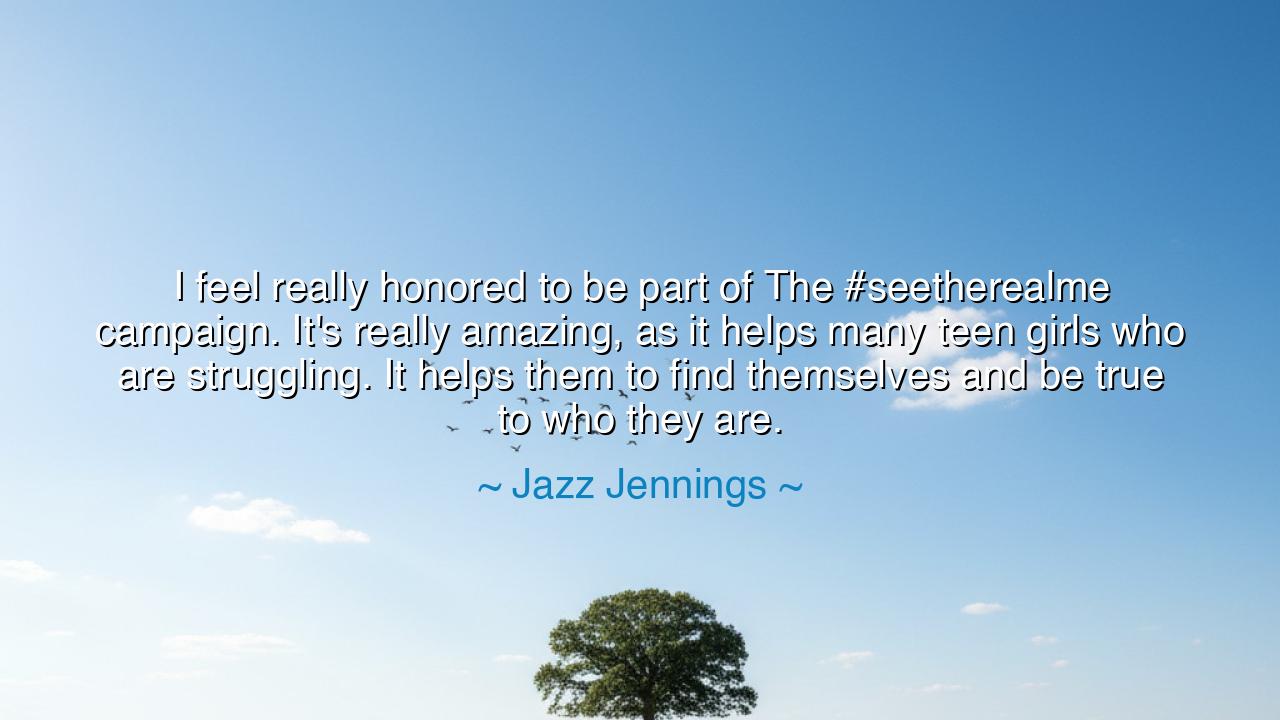
I feel really honored to be part of The #seetherealme campaign.
I feel really honored to be part of The #seetherealme campaign. It's really amazing, as it helps many teen girls who are struggling. It helps them to find themselves and be true to who they are.






Hear the voice of Jazz Jennings, who declared: “I feel really honored to be part of The #seetherealme campaign. It’s really amazing, as it helps many teen girls who are struggling. It helps them to find themselves and be true to who they are.” At first these words shine with the light of gratitude, yet beneath them lies a wisdom as old as humanity itself: that the greatest honor is not in fame, but in service; not in being seen, but in helping others to see themselves.
The #seetherealme campaign was not born as a mere slogan, but as a movement to strip away false masks, to remind young women that their worth lies not in appearances, but in authenticity. Jennings, herself a figure of courage and resilience, recognizes that to stand with this cause is to join the eternal struggle for selfhood against the weight of society’s expectations. Her joy is not for her own honor, but for the liberation of countless souls who long to hear the words: “You are enough, as you are.”
To speak of teen girls who are struggling is to name one of the oldest truths of the human journey. Adolescence has ever been a time of questioning, of wrestling with identity, of feeling lost between childhood and adulthood. And yet, in our age, the pressures have multiplied, amplified by the mirrors of media and the judgments of peers. Jennings speaks into this storm with clarity: to struggle is human, but to overcome requires guidance, compassion, and the courage to look within rather than without.
History bears witness to similar cries. Consider the young Joan of Arc, who in her teens faced not only ridicule but danger, for she claimed her true self against the expectations of her age. To the people of her time, she was not supposed to lead armies, nor to wear armor, nor to hear the voice of God. Yet she refused to be diminished by their vision of who she should be. Like Joan, Jennings points the way for others: that the soul must be true to itself, even when the world resists.
Her words also remind us of the sacred power of representation. When those who struggle see someone like themselves stand tall and unashamed, it breaks the chains of isolation. Jennings, in speaking of her honor, becomes not merely a participant but a beacon. The campaign is not only about beauty—it is about belonging, about the right to exist without apology. This is why her voice carries weight: because it echoes with the ancient truth that no soul is unworthy, no life is invisible, no story is without value.
The lesson, then, is clear: to live truthfully is the highest form of strength. Do not measure yourself by the false idols of perfection or by the fleeting praise of the crowd. Instead, seek the real within you, and honor it. If you are young and struggling, know that you are not alone. If you are older, remember the power of your words and presence to lift others. Each of us can be part of a campaign of truth, not only online, but in our daily lives—by affirming, supporting, and loving those who search for themselves.
And so, let Jazz Jennings’ words be passed down as teaching: to help others see their real selves is a work of honor and greatness. Be true to who you are, and help others to be true as well. In this way, we create a world where no girl, no boy, no soul of any kind feels erased or diminished. For the greatest gift you can give is not wealth nor power, but the light of recognition—the whisper that says, “I see you. Be yourself, and it is enough.”






AAdministratorAdministrator
Welcome, honored guests. Please leave a comment, we will respond soon